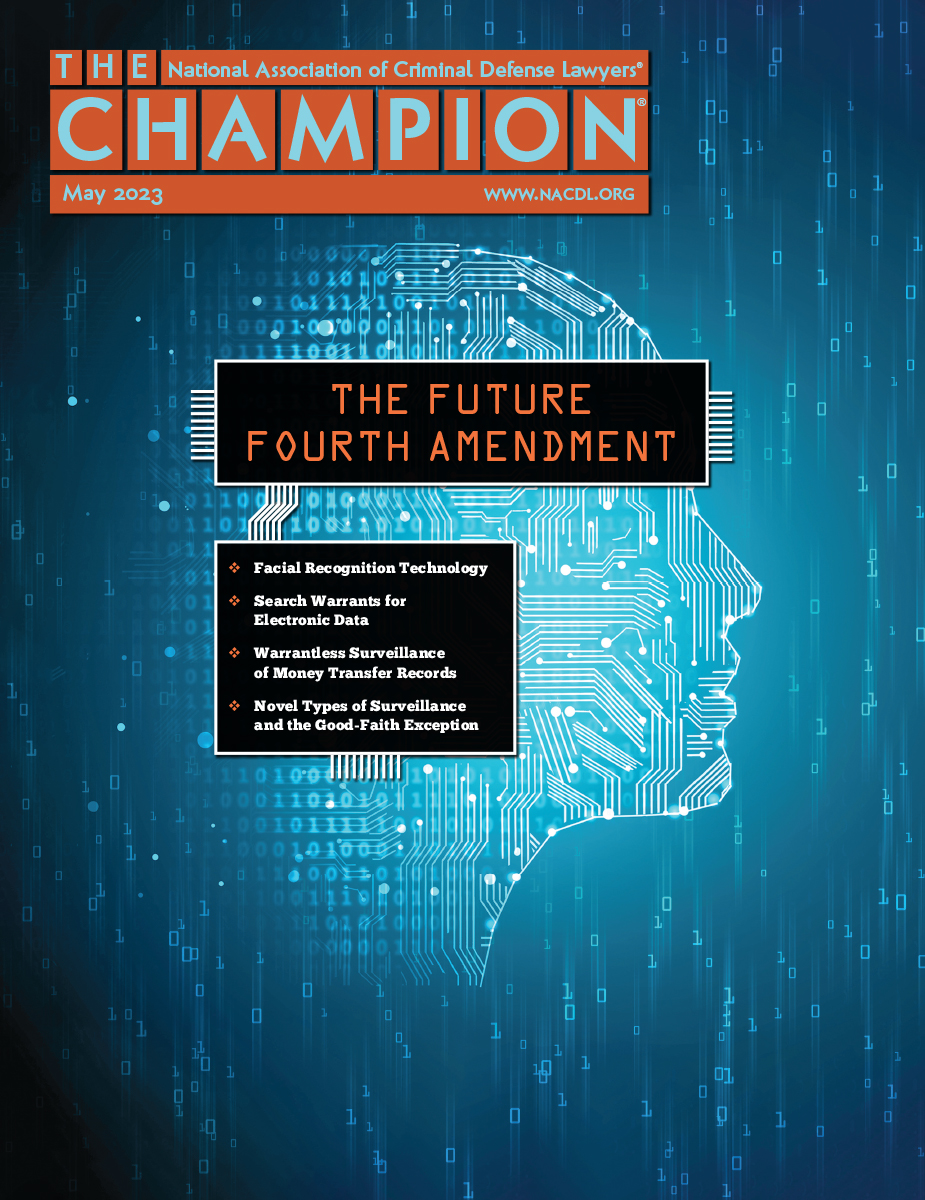May 2023

In this issue of The Champion, learn how to challenge facial recognition searches and how to challenge the application of the exclusionary rule’s good-faith exception in cases involving novel search technologies.
Articles in this Issue
-
Affiliate News
What events are NACDL affiliates hosting this month? Find out here.
-
Book Review: Duped by Saul Kassin
This month Lisa J. Steele reviews Duped: Why Innocent People Confess – and Why We Believe Their Confessions by Saul Kassin.
-
Challenging the Warrantless Bulk Surveillance of Money Transfer Records
For years and without legislative mandate, the Transaction Records Analysis Center (TRAC) has enabled law enforcement agencies to access and search Americans’ money transfer records. If evidence obtained or derived from queries of the TRAC database is at issue in a client’s case, Fourth Amendment arguments are available to seek suppression.
-
From the President: The Fourth Amendment Is but a Shell of Its Former Self
The judicial shift away from strict protection of Fourth Amendment rights has not been subtle, and the price for this diminution of rights has been severe.
-
Making Warrants Great Again: Avoiding General Searches in Executing Warrants for Electronic Data
Case law generally requires law enforcement officers to get a warrant before they search a cellphone, track someone’s location, or obtain sensitive records from service providers. The question whether a warrant is necessary is only the first step. The next question: What does a warrant require? Jennifer Granick reveals the three ways current search warrant practice falls short. She lays out the legal arguments favoring narrow, tailored searches and seizures.
-
NACDL News: At the Supreme Court — A Swearing-In Ceremony for NACDL Members
NACDL News for May 2023
-
NACDL News: NACDL Presents Three Awards in New Orleans
NACDL News for May 2023
-
NACDL News: Nation’s Criminal Defense Bar Issues Statement on the Killing of Tyre Nichols
NACDL News for May 2023
-
Pozner on Cross: Constructive Cross-Examination
What is constructive cross-examination? What are the components of constructive cross-examination chapters? Larry Pozner explains.
-
Public Defense: Right to an attorney only goes so far. Our war on crime leaves injustice in its wake
Americans’ right to legal counsel protects all of us against the government’s power to lock us away, confiscate our possessions, and deny us the ability to earn a living.
Six decades after the Supreme Court’s decision in Gideon v. Wainwright, the promise of that ruling remains unfulfilled.
-
Resisting the Good-Faith Exception in Cases Involving Novel Types of Surveillance
Police officers increasingly are deploying novel surveillance tools, such as cell-cite simulators, to gather evidence. Even when courts acknowledge that the surveillance was unconstitutional, often they decline to suppress the evidence based on the good-faith exception to the exclusionary rule. Laura Moraff offers three arguments defense attorneys can make when challenging the application of the good-faith exception in cases involving novel search technologies.
-
What Defense Counsel Should Know About Facial Recognition Technology
Police officers often rely on facial recognition searches as the primary piece of evidence tying a defendant to a crime, and thus defendants should be permitted to challenge the facial recognition search process. The limited case law on the discoverability, reliability, or admissibility of facial recognition is inconsistent at best. Based on the risk of misidentification, Clare Garvie suggests several steps defense counsel should consider pursuing in facial recognition cases.
